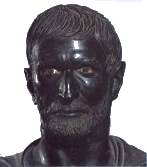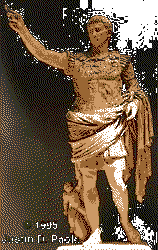
Marcus Valerius Martialis
(Latin poet of the first century, was born in Bilbili- Today Calatayúd - in Spain )

He lived before the time of Nero and then of Flavians. His life in the capital was increasingly beleaguered by economic necessity, the search for patrons and also by annoyances that his caustic works caused him, but he managed to have a little house in the city on the Quirinale, and in a campaign to Nomentum.
In the year 80 he published the 'liber spectaculorum', which consists of 33 epigrams on games of the Flavian Amphitheatre (Colosseum) inaugurated by Titus the year before.
The emperor granted him the 'Ius trium liberorum' - privileges granted to the father of three children - as well as honored him Domitian.
In the year 84 or 85 he issued two books of epigrams (now the twelfth and fourteenth) titled Apophoreta or Xenia (gifts to the spirits); others were published up to the year 96 in which the poet returned to his homeland, in a property that was offered him by an admirer named Marcella.
When in Rome he was in touch with all the literary world of the time (Seneca, and Lucan, Spanish like him, Quintilian, Silio Italico, Flacco, Juvenal, and Statius is only absent from his poems). But above all he was driven by an insatiable curiosity about the life around him, and in this sense Rome was offered as the greatest theater in the world.
Works
Altogether, he wrote 1564 epigrams, the most in elegiac couplets then in heroic verses and Jambs. One of the most controversial aspects of his epigrams is the rampant obscenities, and to defend himself he warns the reader that his verses are not for delicate stomachs and states that 'if my page is lascivious, life is honest' also one meets in its verses the excesses rarely traceable in other poets.
Master of epigram, Martial has been able to concentrate snapshots of life and types of Rome at that time and every time, a portrait gallery of grotesque, humorous or tragic situations. In this sense he is an innovator, as the epigram had been until then an ambiguous poem of various persuasions, often lyrical, funeral or love. However beside the caustic and satirical vein, it runs another, deeper and happy, what makes him write beautiful descriptions of nature, regrets for the distant homeland, affectionate address to friends, epitaphs on dead children.
His various epigrams are an irreplaceable document of Imperial Rome in its full splendor, and have enjoyed great fortune and imitations at all times. His accent is modern verismo, his skills as an observer, the ability to inspire even in a corrupt world, the worst aspects of human reality. But it lacks a comprehensive vision and organic life, as the strong moral conscience which makes the satirist.